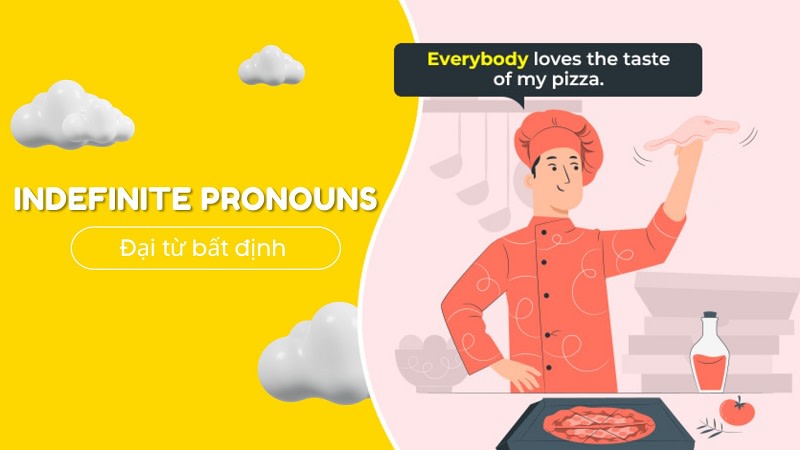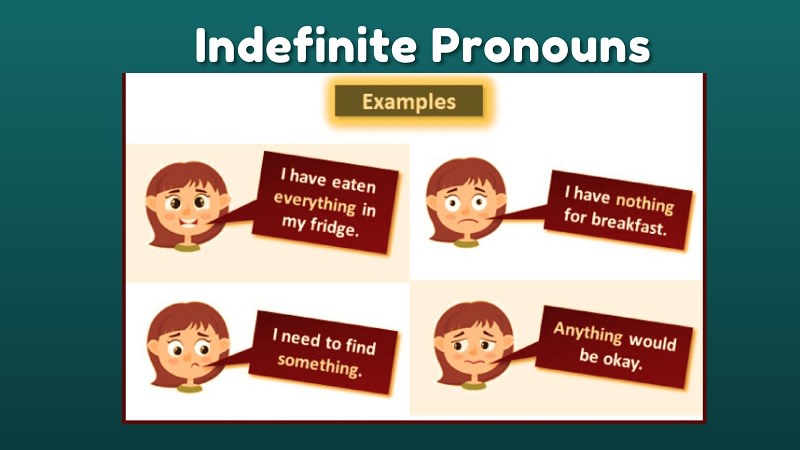Indefinite pronouns are frequently used in English and play a crucial role in both academic and everyday communication. This grammar point often appears in school exams and international English proficiency tests, especially the IELTS exam.
Let’s dive into what indefinite pronouns are, how to use them effectively, and practice with exercises to solidify your knowledge.
1. What Are Indefinite Pronouns?
Indefinite pronouns refer to people, things, or amounts that are not specifically named. These pronouns often describe an unspecified or unknown subject or object. Common prefixes in indefinite pronouns include no-, every-, any-, and some-.
Common indefinite pronouns include: all, any, another, anybody, anyone, anything, everybody, everyone, everything, few, nobody, many, none, several, somebody, someone, etc.
Examples:
Is there anything else that you’d like?
Sometimes, I just need someone to talk to.

2. Placement of Indefinite Pronouns in Sentences
As the subject of a sentence:
No one can disgrace us but ourselves.
Everybody has some weak spots.
As the object of a sentence:
Instead he found something quite extraordinary.
Stay close together – I don’t want anyone to get lost.
After prepositions:
His name’s Hiroshi, but everyone calls him Hiro.
Never give up on anybody. Miracles happen every day.
3. Categories of Indefinite Pronouns
Indefinite pronouns for people (singular):
Everybody / Everyone: all people
Someone / Somebody: one unspecified person
Each: every single person
Anyone / Anybody: any person
Another: one more person
No one / Nobody: no person
The other: the remaining person
Example:
The job would suit someone with a business background.
Indefinite pronouns for things (singular):
Each: every item
Nothing: not anything
Everything: all things
Something: one thing
Anything: any one item
Another: one more item
Example:
Nothing great was ever achieved without enthusiasm.
Indefinite pronouns for people or things (dual):
Both: two items or people
Two others: two different ones
Neither: not either
Either: one or the other
The other two: the remaining pair
Example:
Both options are available.
Two others have been released on bail.
Indefinite pronouns indicating quantity:
All, Some, Any, None, Other, Enough, A little, Little, Less, Much, Many, Most
Example:
Most of the students arrived early.
Some of the cake was left.

4. How to Use Indefinite Pronouns in English
Indefinite pronouns can sometimes cause confusion when it comes to subject-verb agreement or when used with adjectives or possessive forms. Below are some essential usage rules:
As the subject → use singular verb
No one is perfect all the time.
Everybody was enjoying the event.
Followed by adjectives
Is there anything interesting in that box?
Anyone want to join me for a walk?
Possessive forms
He was working like nobody’s business.
The law protects everyone’s rights.
Used in negative sentences
I don’t have anything to do → I have nothing to do.
I don’t have anything to wear → I have nothing to wear.
Without nouns
Much of the world is covered in water.
There was silent agreement from most in the room.
5. Indefinite Pronoun Exercises with Answers
Exercise 1: Choose the correct indefinite pronoun
She would like (anything / something) to eat.
My father knows (nothing / something) about it.
He hasn’t got (something / anything) to do.
We sold (everything / anything) in the sales.
The girl didn’t say (nothing / anything).
Is there (something / anything) amusing on an iPhone?
Our dog must be (somewhere / anywhere).
There was a flood (somewhere / anywhere) in Hanoi.
My mother would like to buy (anything / something) for my dad.
My doctor did (everything / somebody) to save me.
Exercise 2: Fill in the blanks with the correct pronoun
I went shopping yesterday but I couldn’t find anything that I liked. a) nothing b) ✅ anything c) everywhere
Thomas ate everything in his lunch bag except the carrot. a) ✅ everything b) anything c) somebody
Excuse me, waiter. There’s something in my soup. I think it’s a fly. a) ✅ something b) anywhere c) everywhere
I didn’t go anywhere on my holiday. I was so bored! a) nowhere b) somewhere c) ✅ anywhere
My friend thinks intelligent aliens may exist somewhere in the universe. a) anyone b) something c) ✅ somewhere
Master Indefinite Pronouns with IDP IELTS Preparation
Understanding indefinite pronouns and their correct usage is a key step to achieving a high score in your IELTS Writing and Speaking tasks. IDP offers free IELTS resources including expert-led webinars and personalized course recommendations.
For early test preparation, you can register for a free IELTS mock test at any IDP test center. You’ll gain experience with the test format and receive real feedback based on official marking criteria from Cambridge.
Register for your IELTS test with IDP today!
